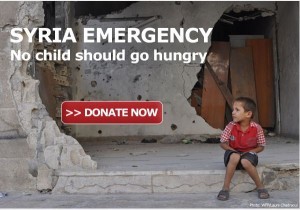“Citizens” still feel hungry!

Razan Zaitouneh
The European Union has recently declared that it will sustain “projects to support Syrians who have been affected by the crisis.” These projects are intended to build citizens’ capacity and civil society institutions, as well as promote democracy and freedom of the press.

This is one of many European offers to help Syrians structure the post-Assad era. These offers seem generous and show a concern with Syria’s future, but they have one flaw: besides preparing for the post-Assad phase, there is something more important, which is dealing with what is happening every day.
Let us put politics aside and only talk about the crises that are becoming harder and harder every day: the hundreds of thousands of internally displaced people, IDPs; the continuous power and fuel shortages during winter; as well as hunger caused by the shortage of flour, because of which Syrians have to follow Queen Marie-Antoinette’s advice of eating cake instead of bread!
European, and more generally Western, governments have not contributed – not even slightly — to solving the severe humanitarian crisis suffocating millions Syrian IDPs and refugees. As exceptions, France, followed by the United States, has offered financial aid that is nonetheless modest when measured against the size of the crisis. Let us not look at the official figures showing the sums that Western governments have dispensed, mostly through international organizations, and part of which has been channelled to the regime. And I will not talk about the corruption and bureaucracy in international organizations either. It is enough that the latter have confessed being unable to reach the areas that have been hit the most by instability. This means that the inhabitants of all of these areas will be deprived of any humanitarian aid.
A few months ago, I asked an official at the International Committee of the Red Cross in Damascus about areas that need urgent help. Her answer was that these areas are too “dangerous” for the organization’s staff members, who feel sorry that they have warehouses full of food materials and blankets that they cannot deliver to those who need them!
Let us concede that the only obstacle preventing aid delivery inside Syria is the inability to reach those who need it; what about refugees in neighbouring countries, who have suffered disasters like the one in Al-Zaatari camp?
European governments prefer to work on the post-Assad phase, providing, on average, 100,000 euros per project, which will cover training fees and staff salaries. This is enough to buy more than 4,000 food baskets, which would feed 4,000 families for an entire month!
This adds to weakening the role of the Syrian National Council and National Coalition in organizing relief work; it is not among the priorities of most Western governments to bolster a political leadership of the revolution. Nor is it their priority to aid the distressed, most of which are women and children. Building a strong civil society in the post-Assad era, however, is at the top of their list!
It seems that Western governments do not realize how all of this will reflect on Syrians. It also seems that they are under the illusion that their small projects might stop sectarian conflicts in the future or make Syrians forget the suffering and hatred they have endured for two years and how the world has let them down. The centres they are seeking to establish will not contribute to solving the problems caused by bloodshed, or the anger, hatred, hunger and cold that Syrians feel.
In the future, the lessons in democracy and training workshops will not help restore faith in these values that they want to teach us through their projects. Where did these governments get the idea that a “citizen” is a creature that feels neither hungry nor cold?!
To compensate for their lack of political support to the revolution , Western governments could have at least offered humanitarian aid. But to ignore this issue and only focus on teaching us the meaning of democracy and human rights through their endless projects is extremely… weird.
It does not make it any weirder that the United Nations has recently cooperated with a regime that has supposedly committed war crimes and crimes against humanity to deliver humanitarian aid. This does not violate the principles of democracy and human rights in any form in the eyes of the governments that are part of the UN. It could be that we still need a lot of civil and legal “education” before we are able to realize how brilliant the conduct of Western governments is.
